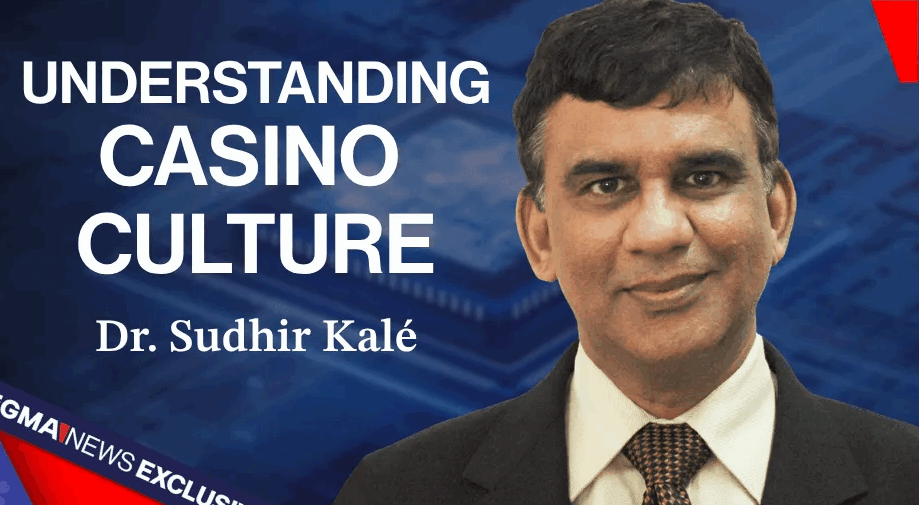As integrated resorts expand from Cyprus to the Philippines, casino organizational culture is undergoing a fundamental shift—one that is redefining how gaming properties operate. In an exclusive interview with SiGMA News, Dr. Sudhir Kalé, who has advised top-tier casinos like Marina Bay Sands, Crown Casino, and Galaxy Macau, emphasized that the industry is facing unprecedented challenges that could reshape the essence of hospitality gaming.
Understanding Global Casino Culture with Industry Expert Sudhir Kalé

The Evolution of Casino Culture: From Social to Task-Oriented
Cultural transformation in casinos hasn’t occurred overnight. Dr. Kalé identifies three major catalysts that have fundamentally altered the industry’s DNA:
- The global financial crisis
- The COVID-19 pandemic
- High-profile compliance breaches at major operators such as Crown Melbourne and The Star Entertainment Group
“These events have pushed cultures around the world toward being more task-focused, rather than relationship-centric,” Dr. Kalé explains. This marks a significant departure from the industry’s roots, where personal relationships and intuitive customer service were paramount.
Globalization has led to cultural convergence. Systems developed in the U.S. and policies introduced in Australia are now standard worldwide. While this brings operational consistency, it has also resulted in rigid, rule-bound environments where compliance often takes precedence over customer-centric service.
“There’s more focus on internal affairs than customer-facing innovation,” says Dr. Kalé. This inward shift has serious implications for the customer experience, with casinos becoming less adaptable to individual needs.
Five Warning Signs of a Toxic Culture
Through his research, Dr. Kalé has identified five telltale signs of toxic organizational culture, which—though differing by region—universally degrade the customer experience:
- High Power Distance
Particularly in East Asia, communication between Western executives and local staff is minimal. In Macau, Dr. Kalé encouraged executives to spend two hours on the casino floor and learn 26 basic Cantonese phrases—a simple step that drastically improved morale and bridged the “us vs. them” gap. - Compliance Obsession
The West has moved from “profit before compliance” to “compliance before profit.” At Crown, CEO Ciaran Carruthers spent two years regaining regulatory trust but eventually resigned following cultural reforms. - Departmental Silos
A divide exists between gaming and hospitality functions, often due to leadership’s one-sided industry background. “Executives either come from gaming or hospitality—rarely both,” Dr. Kalé notes. - Customer Experience Deficit
Despite hospitality models from brands like Four Seasons and Shangri-La, few can name a casino known for outstanding customer experience—a cultural shortfall in the sector. - Erosion of Human Connection
As casino companies consolidate, loyalty executives now manage multiple properties, reducing their ability to build personal relationships.
COVID-19’s Lasting Impact on Employees
The pandemic disrupted more than operations—it redefined the employer-employee relationship. Dr. Kalé refers to a “Great Resignation,” with over 40% of hospitality workers considering quitting.
“COVID gave people time to reflect,” he explains. Employees began reassessing work-life balance, career growth, and purpose. Many chose not to return to pre-pandemic conditions.
The way employers handled the crisis has had lasting effects. Companies that retained their workforce faced fewer post-pandemic labor shortages. Those that laid off staff immediately saw deep trust fractures. “If the employer is transactional, I will be transactional,” says Dr. Kalé. This attitude erodes loyalty and customer service quality.
The Tech Paradox: Data-Rich but Insight-Poor
Dr. Kalé describes a paradox: “Over the last 15–20 years, we’ve become data-rich but insight-poor.”
Casinos now deploy facial recognition and IoT technologies to track behaviors and emotions. At The Venetian, Dr. Kalé even experimented with combinations of music and scent to influence customer behavior.
Yet these advances come at a cost. Traditional service touchpoints—reward counters, casino hosts, personal interactions—have been replaced by automation.
“Most casinos have removed guest reception altogether,” he laments. “Algorithms now determine everything—from your tier status to event invitations.”
This tech-driven model ignores the core appeal of land-based casinos: human interaction. “If you don’t want to engage with people, you’d play online,” he says. The current trend of avoiding customer contact contradicts the spirit of hospitality gaming.
Market Consolidation: Losing the Human Touch
As industry consolidation grows—90% of the global casino market is controlled by four or five firms—Dr. Kalé warns of diminishing human warmth.
“The loyalty executive who used to know you by name now manages ten properties,” he explains. As a result, brand loyalty erodes, and executive tenure shrinks. Where once a casino executive might stay 40 years, now five years feels like a lifetime.
This “rootlessness” extends to entire brands. Las Vegas Sands, despite its name, no longer operates in Las Vegas. Most of Wynn Resorts’ revenue comes from Macau. “Everyone feels this lack of belonging,” Kalé observes. “People are hungry for connection and community.”
Looking Ahead: Three Trends for 2025–2026
Dr. Kalé outlines three emerging trends that will reshape organizational culture:
- Deeper Tech Integration
AI, computer vision, and real-time analytics will offer powerful insights—but must not come at the expense of emotional connection. - Stricter Global Compliance
Regulatory violations in any one jurisdiction can affect licenses globally, making compliance a necessity, not a luxury. - Centralized Decision-Making
Intuitive decisions by floor managers—like comping a meal—are a thing of the past. Today, algorithms call the shots.
The Two Engines of Success: CX + Employee Engagement
Despite the challenges, Dr. Kalé presents a hopeful path forward—powered by Customer Experience (CX) and Employee Engagement:
- His top recommendation to CEOs: Hire a Chief Experience Officer (CXO) who reports directly to the CEO. Every strategic decision must link to CX outcomes.
- Employee engagement is equally vital. “You can never pay too much attention to engagement,” he stresses.
In his most radical proposal, Dr. Kalé suggests merging HR and marketing into a single “People Department” or “Customer Department”, giving equal weight to internal and external stakeholders.
The logic is compelling: engaged employees stay longer, exceed expectations, and become brand ambassadors. The result is a virtuous cycle—enhanced employee experience improves customer experience, boosting both revenue and profit.
About Dr. Sudhir Kalé
Dr. Sudhir Kalé holds a PhD in Marketing from the University of Illinois and has over two decades of experience consulting across five continents. He has published 150+ articles on casino marketing and management and has advised brands such as:
- Marina Bay Sands
- Crown Casino
- Wynn Macau
- Galaxy Macau
- Mohegan Sun












